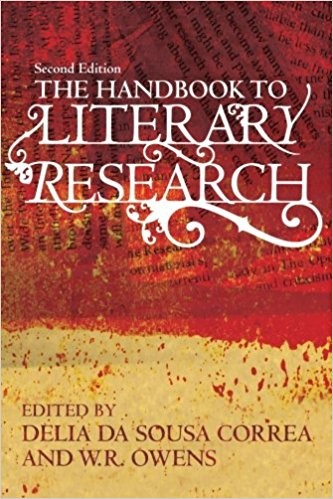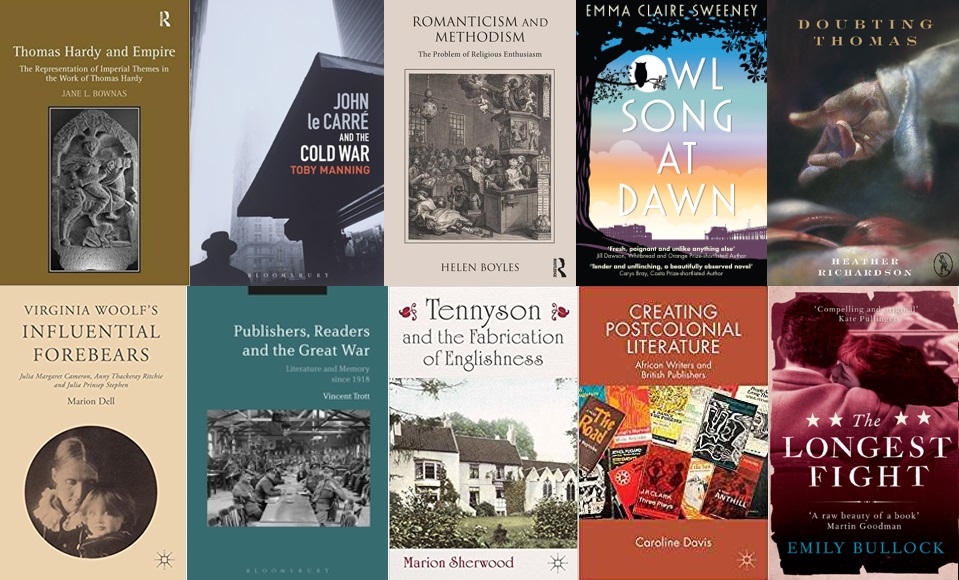Postgraduate Research in English
Taught MA in English
 The MA in English provides intensive tuition in postgraduate literary studies and also develops the skills required for independent literary research. The first two-thirds of the MA comprises course work, and the final third a mini-dissertation. To get an idea of the level of work involved and the approach taken on this MA, see the introductory material and set texts for MA English Part 1 (A893).
The MA in English provides intensive tuition in postgraduate literary studies and also develops the skills required for independent literary research. The first two-thirds of the MA comprises course work, and the final third a mini-dissertation. To get an idea of the level of work involved and the approach taken on this MA, see the introductory material and set texts for MA English Part 1 (A893).
The Handbook to Literary Research (2010), edited and written by current and past members of the discipline, is a vital preparation for and companion to postgraduate study in the discipline.
PhD Degrees in English
The Department of English and Creative Writing at The Open University offers PhD supervision in any area that matches the research expertise of individual academic members of the discipline. You could also consult the themes covered by our Research Groups.
We have three English discipline groups: History of Books and Reading (HOBAR), Postcolonial and Global Literatures, and Contemporary Cultures of Writing, as well as three interdisciplinary groups: Literature and Music; Gender and Otherness in the Humanities (GOTH); and Digital Humanities (DH_OU).
Key Information:
We welcome new enquiries for the next academic year. For MA-related enquiries, please call 0300 303 2477 in the first instance. If you have a query related to undertaking PhD study in English or Creative Writing at the OU, please email our Postgraduate Convenor: [email protected].
The deadline for completed applications for the year commencing in October 2025 will be in early January 2025.
We offer supervision in teams, and training and support are provided by the Discipline, the Faculty, and the Graduate School. Find out more about current students and some of their successes below.
Research Students
How to apply
The application deadline for the PhD Programme is in January every year. However, if you want your proposal to be successful, you’re advised to start working on your application well in advance.
Details of the application procedure are available from the Research Degrees website, and we recommend that you contact our postgraduate convenor in advance if you are considering making an application via [email protected].
Detailed advice on how to produce a research proposal is also available online. Key issues to bear in mind from the start include the fact that a PhD should be 'an original contribution to knowledge' - so you need to check existing scholarship in your field. Second of all, as how to produce a research proposal indicates, it is always useful to have research questions guiding your enquiry. The English & Creative Writing PhD proposal form offers specific guidance on what should be included in your proposal. Please be sure to include this form with your application.
We currently have supervision capacity and expertise in the following areas:
Book History
Digital Humanities and Digital Cultures
- Projects which use digital approaches to literature (e.g. text analysis, stylometry)
- Projects which study digital literary productions (e.g. digital texts, multimedia)
Shakespeare and Early Modern Drama
Sixteenth and Seventeenth Century Literature
- C16th/C17th manuscripts and manuscript culture
- Sir Walter Raleigh
- Writings connected to the Elizabethan or Jacobean royal court.
Eighteenth Century Literature
- Fiction and poetry
- Romanticism (including European Romanticism)
Nineteenth Century
- Gothic
- Popular C19th literature
- Victorian fictions of Empire
- Popular print media
Twentieth Century
- Modern poetry
- History of the press
Contemporary Literature
- Dark academia
- Contemporary gothic
- Representations of death and dying
- Urban fiction, resource fiction, eco-criticism
- Architecture and infrastructure
- Literature and politics
- Letters and life writing
Literary Heritage
- Literary geography
- Literature and material culture
Global Literature
- Colonial and postcolonial literature relating to South and Southeast Asia
- Contemporary global literature in English
- Indian anglophone writing.
Late Medieval and Renaissance
- Renaissance poetry
- Chaucer
For PhD proposals with a Creative Writing focus, see the specific information and guidance.
Studentships
We hope to offer full-time, funded places once more for future entries. Watch this space for further details, which we will upload as soon as they are available.
Suitable applicants will be encouraged to apply for funding. Follow these links to find out about funding through the Faculty, financial support for research degrees and applications to The Arts and Humanities Research Council.
The support structure for the PhD
Students who are accepted on to the programme are provided with two supervisors who are published writers and recognised experts in the teaching of English. They both read and give feedback on regular submissions of your work. The supervisors work together to help your development through written feedback, regular face to face meetings or video conferencing. The Research School provides a programme of training sessions in aspects of doctorate research and the English discipline runs occasional postgraduate research days that provide opportunities for networking and gaining practice in public speaking. Your progress is carefully monitored with detailed reports prepared by both the student and supervisors at six monthly intervals. There is a probation process near the end of the first year (second year for part-time students). Successful passing of this enables students to transfer from MPhil registration to PhD.
Some of our PhD students have joined Literary Societies as reviewers and organisers of events, and there are now opportunities in the Faculty to gain valuable experience of our teaching on Module Teams. Recent PhD students have a distinguished record of converting their PhD texts into books.
PhD to Books
Recent English and Creative Writing PhD work has appeared as scholarly monographs and novels published by reputed publishers and received significant critical notice. We are pleased to profile some of these here.
Helen Chambers, Conrad’s Reading: Space, Time, Networks (Palgrave Macmillan, 2018)
Toby Manning, John Le Carré and the Cold War (Bloomsbury, 2018)
Vincent Trott, Publishers, Readers and the Great War (Bloomsbury, 2017)
Helen Boyles, Romanticism and Methodism. The Problem of Religious Enthusiasm (London: Routledge, 2016)
Marion Dell, Virginia Woolf’s Influential Forebears: Julia Margaret Cameron, Anny Thackeray Ritchie and Julia Prinsep Stephen (Palgrave Macmillan, 2015)
Caroline Davis, Creating Postcolonial Literature: African Writers and British Publishers (Palgrave Macmillan, 2013)
Marion Sherwood, Tennyson and the Fabrication of Englishness (Palgrave Macmillan, 2013)
Jane Bownas, Thomas Hardy and Empire: The Representation of Imperial Themes in Thomas Hardy (Routledge, 2012).
Request your prospectus
![]()
Explore our qualifications and courses by requesting one of our prospectuses today.



